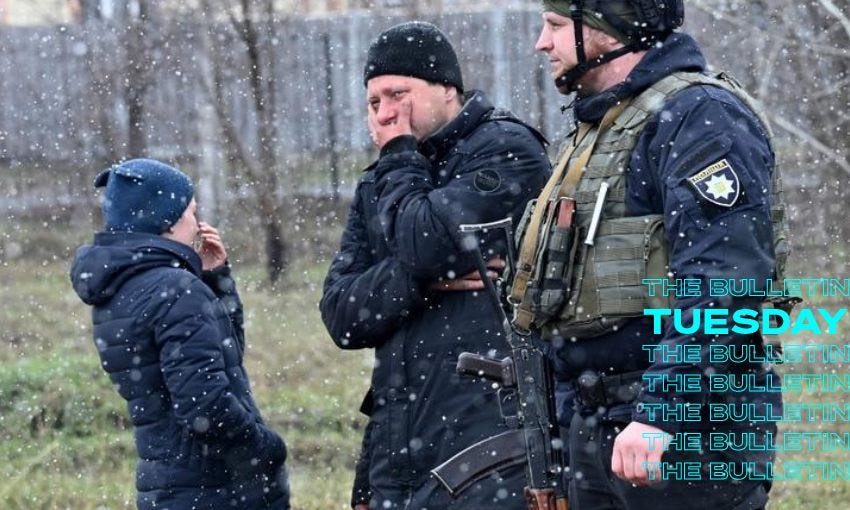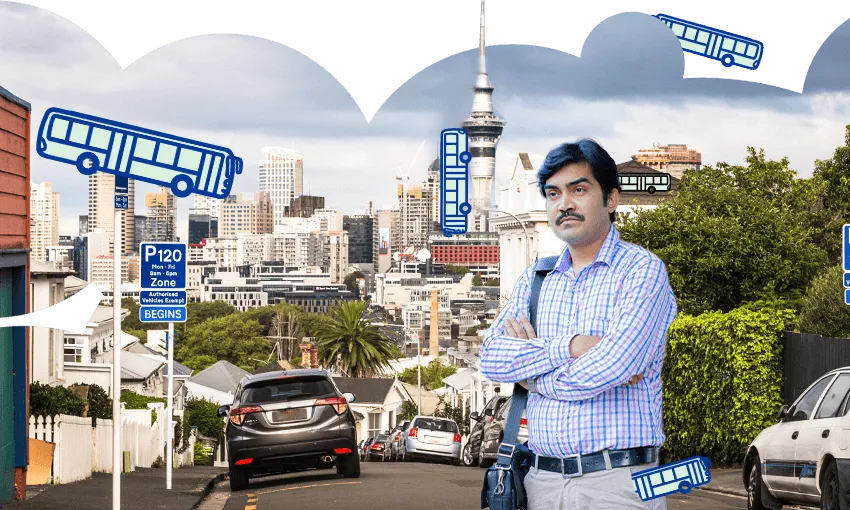Russian war crimes in Ukraine
Global horror as mass graves, hundreds of civilians left dead by retreating Russian troops
Mōrena and welcome to The Bulletin for Tuesday, April 5, by Justin Giovannetti. Presented in partnership with Z Energy.
In today’s edition: Sticking with red for now; global climate plan unveiled; the great Gib shortage; but first, the Russian army’s crimes in Ukraine.
Residents of Bucha reported the indiscriminately killing of civilians during the Russian occupation. (Image: RNZ/AFP)
Horrifying images and testimony emerge from Ukraine as Russian forces withdraw.
The massacre of over 400 civilians in the city of Bucha, just outside Ukraine’s capital of Kyiv, has unleashed a torrent of global outrage. This is not a pleasant story, but we have an obligation to bear witness. RNZ published reporting from the city, with disturbing details about what Ukrainian troops found after a five week Russian occupation. Ukraine’s president has labelled Russian forces as “butchers” after bodies were found with their hands still bound together. Bound by white armbands, which Russian forces had required all civilians to wear. The Guardian also reported on widespread sexual violence used as a weapon by Russian forces in occupied areas. The Russian defence ministry said in a statement that “not a single local resident suffered from any violent actions”.
Prime minister Jacinda Ardern said the international community was witnessing war crimes. “The reports of Ukrainian civilians who have been killed, raped and severely wounded by Russian troops is beyond reprehensible. Russia must answer to the world for what they have done. It goes without saying that these atrocities are against international law,” she said yesterday. “Russia will be held to account.”
How the world will respond.
Almost six weeks into Russia’s invasion of Ukraine, it’s unclear if the world’s sanctions and moral outrage will be enough. Following the Bucha killings, Germany said the west would adopt stricter sanctions, Reuters reports. There’s now talk of ending European gas imports from Russia, which would be a costly and difficult move by Europe. But how do you trade with a nation that has committed such awful crimes? The images coming out of Ukraine show indescribable brutality by Russian conscripts. The war in Ukraine is not over. The International Criminal Court is now investigating and New Zealand is providing the court with all the evidence it can muster.
New Zealand’s support will go further.
I was struck by Ardern’s answer yesterday, when asked if she’d consider sending weapons to the Ukrainians. In effect, she said that distinction is now arbitrary. New Zealand might not be sending guns or bombs, but it’s helping Ukraine in a lethal way. New Zealand soldiers now stationed in Europe are passing on real-time intelligence to Ukraine, helping guide its artillery strikes. New Zealand-donated radios are helping Ukrainian forces coordinate their attacks, while New Zealand-donated body amour is keeping them safe. But New Zealand could always do more. Overnight, 36 more wealthy Russians were added to New Zealand’s sanctions register, according to RNZ. While outgoing Chelsea FC owner Roman Abramovich is now on the list, Alexander Abramov, owner of the luxury Helena Bay lodge in Northland, isn’t.
The next steps will be difficult for the world.
The Russians have a history of winning wars that start disastrously for them, by throwing in loads of men and material to overwhelm defenders. The NZ Herald reports that Russian president Vladimir Putin now faces a tough decision after his military was depleted by its disastrous campaign. He could drop the pretence that Russia is conducting a “special military operation”, declare war and call up reserves for an all-out assault on Ukraine. Otherwise, he doesn’t have the manpower left to fight a war of attrition.
BBC Newsnight has looked at a single elite unit of Russian paratroopers, mauled on the first day of the invasion. The 331st Guards Parachute Regiment was trying to seize Kyiv’s Hostomel airport when it suffered serious casualties. The unit then fought street battles in Bucha. The BBC looks at the wave of death notifications received in the unit’s hometown of Kostroma, a Russian city north east of Moscow. The reports back to Russians seem to showcase the disintegration of the country’s war goals in Ukraine.
The battle for Donbas.
After ending its attack on Kyiv, Russia is now focusing on Ukraine’s east. The coming weeks will likely focus on the battle for Donbas. The region makes up about 10% of Ukraine’s landmass and its people have been culturally bisected by connections to their Ukrainian west and Russian east for generations. Moscow-backed separatists began a civil war in the region after Russia seized nearby Crimea in 2014. Mariupol, a major port city, has been under brutal siege for weeks. It’s in southern Donbas, standing between Russia’s Crimean forces and its allies in the region. It’s unclear if the west is willing to let Russia win. Writing in the Atlantic, Anne Applebaum argues the democracies need to start defending themselves, or the world’s autocrats will destroy them.
We need your help! The Spinoff's independent, homegrown journalism is only possible because of our members.As we struggle against the continued erosion of the media business by big tech platforms and now the commercial uncertainty brought on by the pandemic, reader support is critical.
If you can, support independent media today by becoming a member.
New Zealand will remain in red until Easter weekend at the earliest.
Leaders in hospitality and events had hoped for a shift to the orange light, but it won’t be happening this week. Bridie Witton & Thomas Manch write in Stuff that it came down to caution as omicron wanes. “We are not out of the woods yet,” the prime minister said yesterday. There’s concern that behaviours could change with a move to orange, setting the country’s sense of security back. The next traffic light review is April 14, a day before the Easter holiday begins.
The mandatory scanning of vaccine passes is now history. 1News looks at the divided views of the change. Some business owners are keen on the end of scanning, while some customers are a little concerned they might now sit in a restaurant beside the unvaccinated.
UN releases global plan to limit climate change damage.
First, the good news: The world can avoid destructive climate change this century, according to the latest report from the Intergovernmental Panel on Climate Change. The bad news, every policy adopted by every government so far is not nearly enough. RNZ reports that emissions need to peak by 2025 and then everything we do, buy and eat must change substantially. In three years. Then in the second half of this century we need to build machines to pull carbon from the air, a technology that is currently very expensive. The alternative is worse.
Air NZ shares had a tough day on the NZX, with errors in trading.
The national airline is trying to raise $1.2 billion from shareholders in a complicated series of moves. However as Stuff reports, an error by the New Zealand stock exchange made things much worse. Trading was halted after it became clear shares were trading at the wrong price, except the NZX didn’t advertise the halt. People then spent the rest of the day trying to figure out what had happened, or not happened, and what might have happened that shouldn’t have. The confusion didn’t help Air New Zealand’s share price, which fell 28%.
The strategy to solve New Zealand’s Gib shortage.
The NZ Herald (paywalled) has detailed the extraordinary steps being taken to fix a Gib board market that is completely out of control. With shortages, some boards are now selling for thousands of dollars. Fletcher Building, which control 94% of the market, is now running its factories around-the-clock, rationing sales and building a vast new factory to further increase supply. The timing couldn’t be worse for Fletcher. The Commerce Commission is currently investigating whether building materials are overpriced in Aotearoa. Unlike the commission’s previous probes of petrol and groceries, this one is a clear monopoly.
Long reads: Distrust and misinformation in Aotearoa.
One of the leaders of the occupation outside parliament is now standing in the Tauranga byelection. Politik details Sue Grey’s plan in Tauranga and the area’s status as a good place for fringe parties. How could someone who helped organise a protest that ended in a fiery riot now run for office? Misinformation and anti-vaccine beliefs are alive and well a month after the protest ended. Kristin Hall wrote a three part series for 1News that’s worth reading. Part one looks at people who have gone down the rabbit hole and come back. Part two calls for the regulation of social media giants. Part three asks why so many Māori and disadvantaged New Zealanders get drawn to the protest. It’s excellent reporting that looks at the serious problem of misinformation.
Got some feedback about The Bulletin, or anything in the news? Get in touch with me at thebulletin@thespinoff.co.nz
Hayden Donnell argues that Auckland Transport’s radical plan to remove parking is no such thing. Lauren Keenan writes that history in schools needn’t be a battle. Mirjam Guesgen (partnership) reports on what New Zealand can learn and teach about climate change. Sam Brooks provides a play-by-play of the bonkers new Dancing with the Stars promo. Stewart Sowman-Lund, in a helpful story for me, writes about how breakfast broadcasters hack the horrific hours. Much coffee?
Black Caps see off Ross Taylor with dominant win.
New Zealand’s team beat the Netherlands by 115 runs to complete a 3-0 series sweep. Taylor, 38, finished as New Zealand’s most successful one-day batsman. RNZ reports that he couldn’t hold back tears as the teams lined up for the national anthems in Hamilton. In his final act on the field, he took a catch to seal the team’s win.










